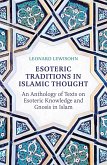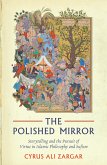- Gebundenes Buch
- Merkliste
- Auf die Merkliste
- Bewerten Bewerten
- Teilen
- Produkt teilen
- Produkterinnerung
- Produkterinnerung
This fascinating work profiles Abu Hamid al-Ghazali, the foremost Islamic scholar and mystic of the medieval period.
Andere Kunden interessierten sich auch für
![Aisha Al-Ba'uniyya Aisha Al-Ba'uniyya]() Th. Emil HomerinAisha Al-Ba'uniyya37,99 €
Th. Emil HomerinAisha Al-Ba'uniyya37,99 €![Esoteric Traditions in Islamic Thought Esoteric Traditions in Islamic Thought]() Leonard LewisohnEsoteric Traditions in Islamic Thought29,99 €
Leonard LewisohnEsoteric Traditions in Islamic Thought29,99 €![Sufism Sufism]() William C. ChittickSufism18,99 €
William C. ChittickSufism18,99 €![Polished Mirror Polished Mirror]() Cyrus Ali ZargarPolished Mirror31,99 €
Cyrus Ali ZargarPolished Mirror31,99 €![Ikhwan Al-Safa' Ikhwan Al-Safa']() Godefroid de CallatayIkhwan Al-Safa'30,99 €
Godefroid de CallatayIkhwan Al-Safa'30,99 €!['Abd Al-Ghani Al-Nabulusi 'Abd Al-Ghani Al-Nabulusi]() Samer Akkach'Abd Al-Ghani Al-Nabulusi31,99 €
Samer Akkach'Abd Al-Ghani Al-Nabulusi31,99 €![Abd Al-Rahman III Abd Al-Rahman III]() Maribel FierroAbd Al-Rahman III37,99 €
Maribel FierroAbd Al-Rahman III37,99 €-
-
-
This fascinating work profiles Abu Hamid al-Ghazali, the foremost Islamic scholar and mystic of the medieval period.
Hinweis: Dieser Artikel kann nur an eine deutsche Lieferadresse ausgeliefert werden.
Hinweis: Dieser Artikel kann nur an eine deutsche Lieferadresse ausgeliefert werden.
Produktdetails
- Produktdetails
- Makers of the Muslim World
- Verlag: Oneworld Publications
- Seitenzahl: 160
- Erscheinungstermin: 1. Dezember 2007
- Englisch
- Abmessung: 217mm x 145mm x 17mm
- Gewicht: 302g
- ISBN-13: 9781851684144
- ISBN-10: 185168414X
- Artikelnr.: 23070715
- Herstellerkennzeichnung
- Libri GmbH
- Europaallee 1
- 36244 Bad Hersfeld
- gpsr@libri.de
- Makers of the Muslim World
- Verlag: Oneworld Publications
- Seitenzahl: 160
- Erscheinungstermin: 1. Dezember 2007
- Englisch
- Abmessung: 217mm x 145mm x 17mm
- Gewicht: 302g
- ISBN-13: 9781851684144
- ISBN-10: 185168414X
- Artikelnr.: 23070715
- Herstellerkennzeichnung
- Libri GmbH
- Europaallee 1
- 36244 Bad Hersfeld
- gpsr@libri.de
Eric Ormsby is Chief Librarian at the Library of The Institute of Ismaili Studies, London. He was formerly Professor and Director of the Institute of Islamic Studies, McGill University.
Preface
Abbreviations
Names and terms
Chronology
INTRODUCTION
The Seljuqs
The "Schools" of Law
The Notion of Kalam
The Mu'tazili Factor
Ash'ari and the Three Brothers
Philosophy (Falsafa)
The Isma'ilis
Sufism
1 THE RISE TO RENOWN
A Child of Khorasan
The Stages of his Career
Early Studies: Sufi Masters and Theologians
Juwayni
The Patronage of the Powerful
Ghazali at Court
The Temptations of Prestige
2 DEVOTION TO THE LAW
Ghazali's Contributions to Law
The Example of Analogy (qiyas)
The Indolence of the Learned
Shafi'i: the Beloved Model
Fidelity to the Law
3 THE DOUBLE-EDGED DISCIPLINE: GHAZALI AND THEOLOGY
Theology vs Philosophy
Against a "Religion of Donkeys"
Ghazali the Theologian
The Dogmatic Manual al-Iqtisad fi'l-i'tiqad
Ghazali's Mode of Argument in "The Just Balance"
The Shadow of Ibn Sina
A Human Accent
Ghazali on Divine Names
The Absence of Insight as Insight
A Manual for Meditation
Ghazali's Attitude towards Kalam
4 THE POISON OF PHILOSOPHY AND ITS ANTIDOTE
Did Ghazali Destroy Philosophy in Islam?
The Seductiveness of System
The Exposition of Philosophy: the Maqasid al-Falasifa
The Attack: Tahafut al-Falasifa
5 CRISIS AND RECOVERY
The Breakdown of 1095
Sickness and Health
Al-Munqidh min al-Dalal ("The Deliverer from Error")
Scepticism and Ghazali: His Early Crisis
The Significance of Dream
The Four Ways
The Decisive Break and the Departure from Baghdad
Baghdad, the "Nest of Darkness"
The Role of Ahmad Ghazali
6 THE REVIVAL OF ISLAM
The Character of the Ihya'
The Architecture of the Ihya'
CONCLUSION: KNOWLEDGE IN ACTION
The Return to Teaching
Death and Posthumous Career
Bibliography
Index
Abbreviations
Names and terms
Chronology
INTRODUCTION
The Seljuqs
The "Schools" of Law
The Notion of Kalam
The Mu'tazili Factor
Ash'ari and the Three Brothers
Philosophy (Falsafa)
The Isma'ilis
Sufism
1 THE RISE TO RENOWN
A Child of Khorasan
The Stages of his Career
Early Studies: Sufi Masters and Theologians
Juwayni
The Patronage of the Powerful
Ghazali at Court
The Temptations of Prestige
2 DEVOTION TO THE LAW
Ghazali's Contributions to Law
The Example of Analogy (qiyas)
The Indolence of the Learned
Shafi'i: the Beloved Model
Fidelity to the Law
3 THE DOUBLE-EDGED DISCIPLINE: GHAZALI AND THEOLOGY
Theology vs Philosophy
Against a "Religion of Donkeys"
Ghazali the Theologian
The Dogmatic Manual al-Iqtisad fi'l-i'tiqad
Ghazali's Mode of Argument in "The Just Balance"
The Shadow of Ibn Sina
A Human Accent
Ghazali on Divine Names
The Absence of Insight as Insight
A Manual for Meditation
Ghazali's Attitude towards Kalam
4 THE POISON OF PHILOSOPHY AND ITS ANTIDOTE
Did Ghazali Destroy Philosophy in Islam?
The Seductiveness of System
The Exposition of Philosophy: the Maqasid al-Falasifa
The Attack: Tahafut al-Falasifa
5 CRISIS AND RECOVERY
The Breakdown of 1095
Sickness and Health
Al-Munqidh min al-Dalal ("The Deliverer from Error")
Scepticism and Ghazali: His Early Crisis
The Significance of Dream
The Four Ways
The Decisive Break and the Departure from Baghdad
Baghdad, the "Nest of Darkness"
The Role of Ahmad Ghazali
6 THE REVIVAL OF ISLAM
The Character of the Ihya'
The Architecture of the Ihya'
CONCLUSION: KNOWLEDGE IN ACTION
The Return to Teaching
Death and Posthumous Career
Bibliography
Index
Preface
Abbreviations
Names and terms
Chronology
INTRODUCTION
The Seljuqs
The "Schools" of Law
The Notion of Kalam
The Mu'tazili Factor
Ash'ari and the Three Brothers
Philosophy (Falsafa)
The Isma'ilis
Sufism
1 THE RISE TO RENOWN
A Child of Khorasan
The Stages of his Career
Early Studies: Sufi Masters and Theologians
Juwayni
The Patronage of the Powerful
Ghazali at Court
The Temptations of Prestige
2 DEVOTION TO THE LAW
Ghazali's Contributions to Law
The Example of Analogy (qiyas)
The Indolence of the Learned
Shafi'i: the Beloved Model
Fidelity to the Law
3 THE DOUBLE-EDGED DISCIPLINE: GHAZALI AND THEOLOGY
Theology vs Philosophy
Against a "Religion of Donkeys"
Ghazali the Theologian
The Dogmatic Manual al-Iqtisad fi'l-i'tiqad
Ghazali's Mode of Argument in "The Just Balance"
The Shadow of Ibn Sina
A Human Accent
Ghazali on Divine Names
The Absence of Insight as Insight
A Manual for Meditation
Ghazali's Attitude towards Kalam
4 THE POISON OF PHILOSOPHY AND ITS ANTIDOTE
Did Ghazali Destroy Philosophy in Islam?
The Seductiveness of System
The Exposition of Philosophy: the Maqasid al-Falasifa
The Attack: Tahafut al-Falasifa
5 CRISIS AND RECOVERY
The Breakdown of 1095
Sickness and Health
Al-Munqidh min al-Dalal ("The Deliverer from Error")
Scepticism and Ghazali: His Early Crisis
The Significance of Dream
The Four Ways
The Decisive Break and the Departure from Baghdad
Baghdad, the "Nest of Darkness"
The Role of Ahmad Ghazali
6 THE REVIVAL OF ISLAM
The Character of the Ihya'
The Architecture of the Ihya'
CONCLUSION: KNOWLEDGE IN ACTION
The Return to Teaching
Death and Posthumous Career
Bibliography
Index
Abbreviations
Names and terms
Chronology
INTRODUCTION
The Seljuqs
The "Schools" of Law
The Notion of Kalam
The Mu'tazili Factor
Ash'ari and the Three Brothers
Philosophy (Falsafa)
The Isma'ilis
Sufism
1 THE RISE TO RENOWN
A Child of Khorasan
The Stages of his Career
Early Studies: Sufi Masters and Theologians
Juwayni
The Patronage of the Powerful
Ghazali at Court
The Temptations of Prestige
2 DEVOTION TO THE LAW
Ghazali's Contributions to Law
The Example of Analogy (qiyas)
The Indolence of the Learned
Shafi'i: the Beloved Model
Fidelity to the Law
3 THE DOUBLE-EDGED DISCIPLINE: GHAZALI AND THEOLOGY
Theology vs Philosophy
Against a "Religion of Donkeys"
Ghazali the Theologian
The Dogmatic Manual al-Iqtisad fi'l-i'tiqad
Ghazali's Mode of Argument in "The Just Balance"
The Shadow of Ibn Sina
A Human Accent
Ghazali on Divine Names
The Absence of Insight as Insight
A Manual for Meditation
Ghazali's Attitude towards Kalam
4 THE POISON OF PHILOSOPHY AND ITS ANTIDOTE
Did Ghazali Destroy Philosophy in Islam?
The Seductiveness of System
The Exposition of Philosophy: the Maqasid al-Falasifa
The Attack: Tahafut al-Falasifa
5 CRISIS AND RECOVERY
The Breakdown of 1095
Sickness and Health
Al-Munqidh min al-Dalal ("The Deliverer from Error")
Scepticism and Ghazali: His Early Crisis
The Significance of Dream
The Four Ways
The Decisive Break and the Departure from Baghdad
Baghdad, the "Nest of Darkness"
The Role of Ahmad Ghazali
6 THE REVIVAL OF ISLAM
The Character of the Ihya'
The Architecture of the Ihya'
CONCLUSION: KNOWLEDGE IN ACTION
The Return to Teaching
Death and Posthumous Career
Bibliography
Index








